アリストテレス|世界の名言集~素晴らしき人が残した名言
アリストテレスの名言
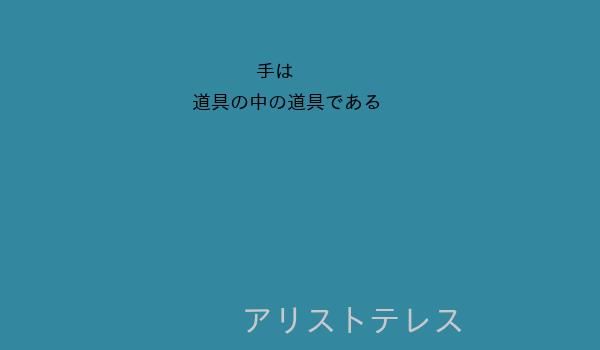
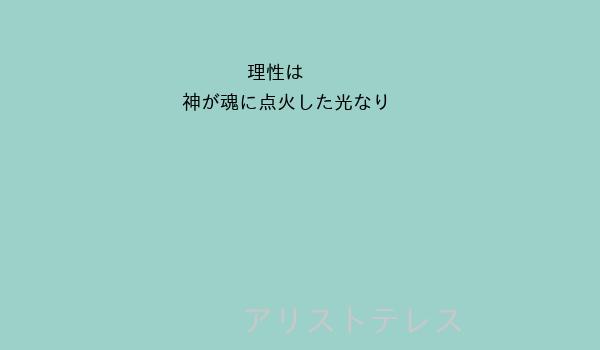
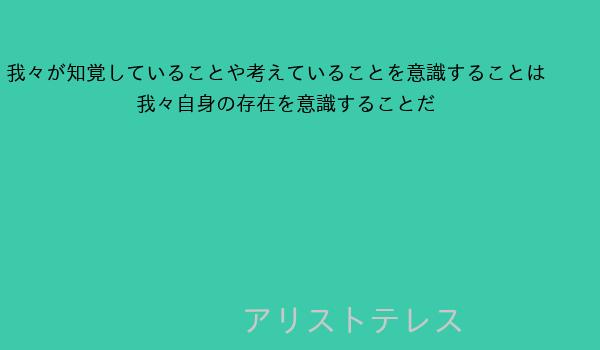
我々が知覚していることや考えていることを意識することは
我々自身の存在を意識することだ
To be conscious that we are perceiving or thinking is to be conscious of our own existence.
我々自身の存在を意識することだ
To be conscious that we are perceiving or thinking is to be conscious of our own existence.
アリストテレス(-)の名言
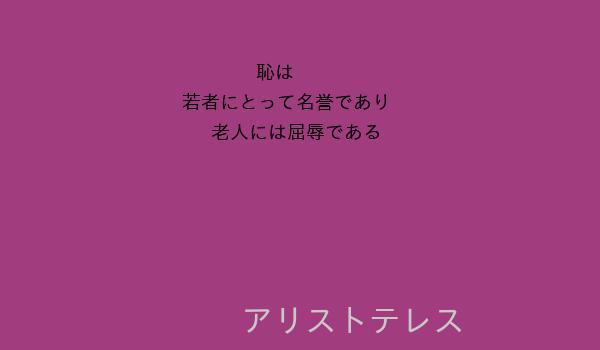
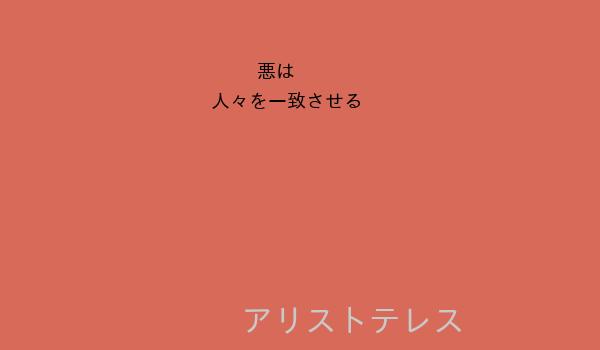
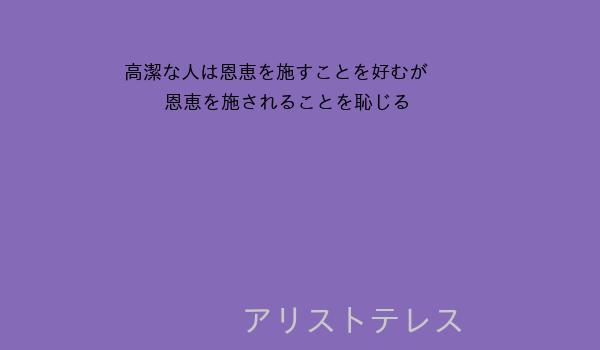
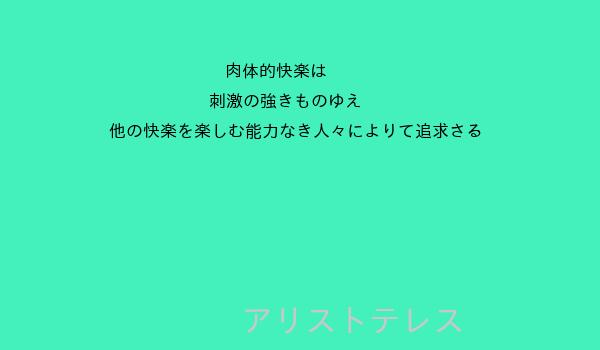
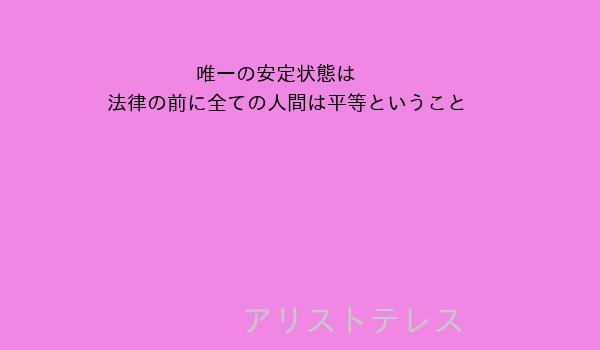
唯一の安定状態は
法律の前に全ての人間は平等ということ
The only stable state is the one in which all men are equal before the law.
法律の前に全ての人間は平等ということ
The only stable state is the one in which all men are equal before the law.
アリストテレス(-)の名言
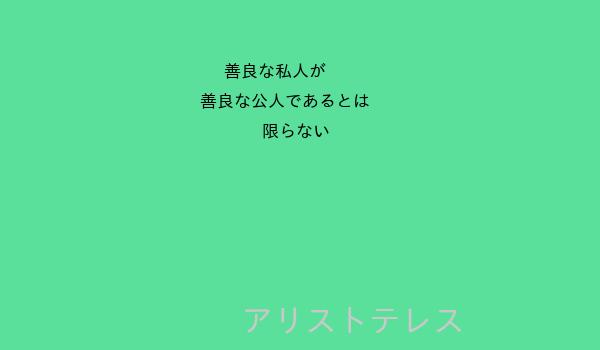
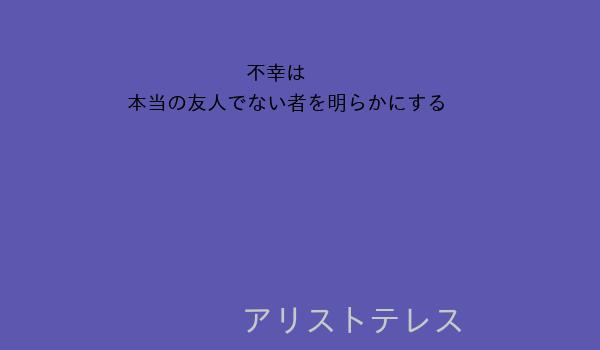
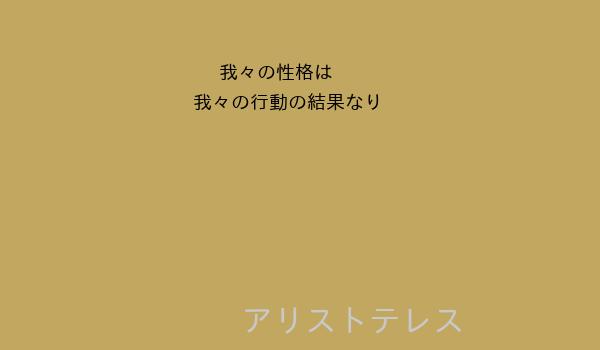
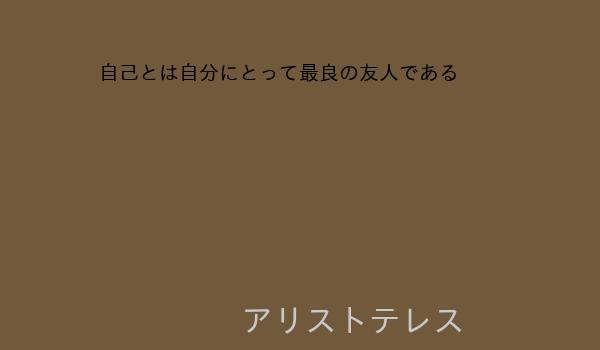
自己とは自分にとって最良の友人である
アリストテレス(-)の名言
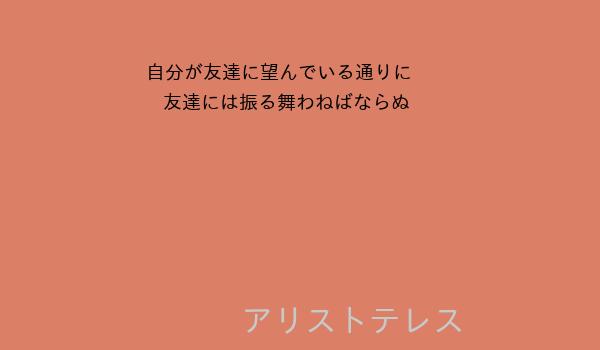
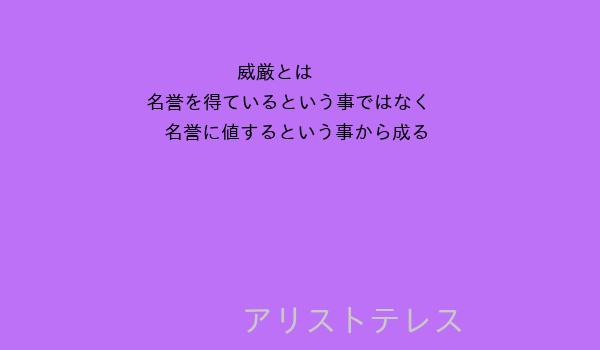
威厳とは
名誉を得ているという事ではなく
名誉に値するという事から成る
Dignity does not consist in possessing honors, but in deserving them.
名誉を得ているという事ではなく
名誉に値するという事から成る
Dignity does not consist in possessing honors, but in deserving them.
アリストテレス(-)の名言
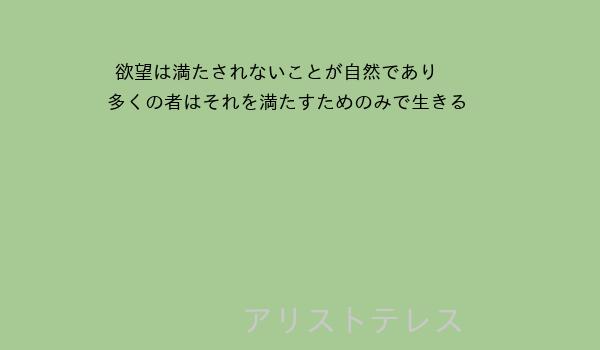
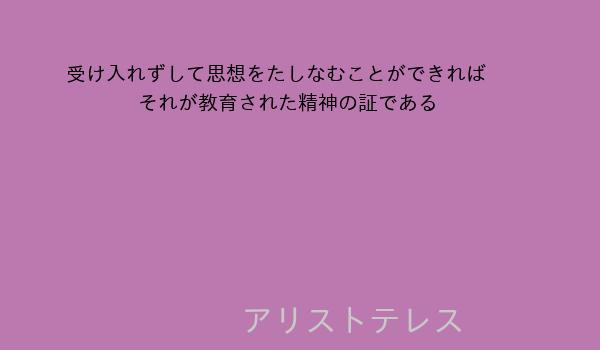
受け入れずして思想をたしなむことができれば
それが教育された精神の証である
It is the mark of an educated mind to be able to entertain a thought without accepting it.
それが教育された精神の証である
It is the mark of an educated mind to be able to entertain a thought without accepting it.
アリストテレス(-)の名言
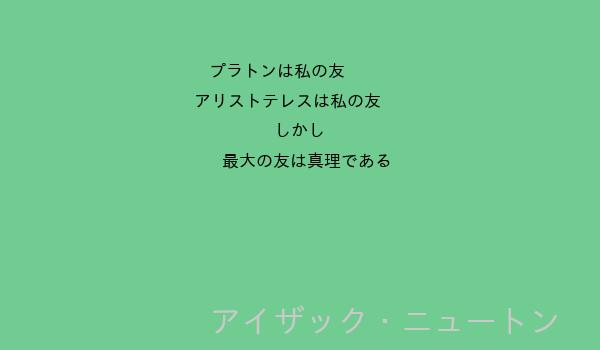
プラトンは私の友
アリストテレスは私の友
しかし
最大の友は真理である
Plato is my friend, Aristotle is my friend, but my best friend is truth.
アリストテレスは私の友
しかし
最大の友は真理である
Plato is my friend, Aristotle is my friend, but my best friend is truth.
アイザック・ニュートン(Isaac Newton-物理学者)の名言
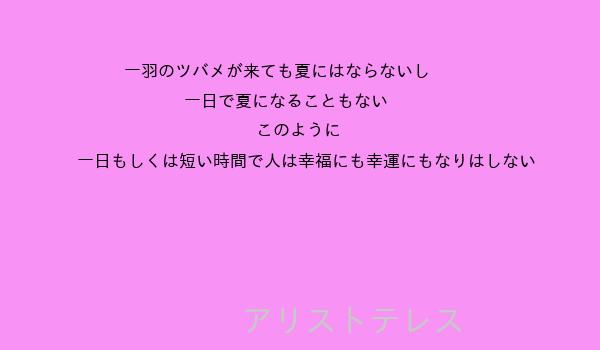
一羽のツバメが来ても夏にはならないし
一日で夏になることもない
このように
一日もしくは短い時間で人は幸福にも幸運にもなりはしない
For one swallow does not make a summer, nor does one day; and so too one day, or a short time, does not make a man blessed and happy.
一日で夏になることもない
このように
一日もしくは短い時間で人は幸福にも幸運にもなりはしない
For one swallow does not make a summer, nor does one day; and so too one day, or a short time, does not make a man blessed and happy.
アリストテレス(-)の名言
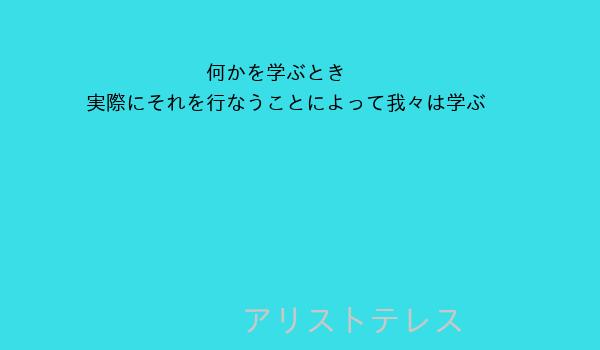
何かを学ぶとき
実際にそれを行なうことによって我々は学ぶ
For the things we have to learn before we can do them, we learn by doing them.
実際にそれを行なうことによって我々は学ぶ
For the things we have to learn before we can do them, we learn by doing them.
アリストテレス(-)の名言
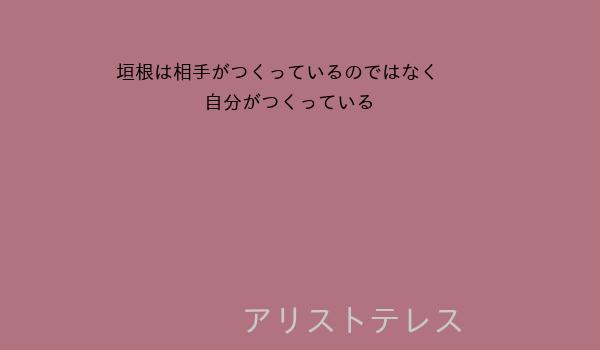
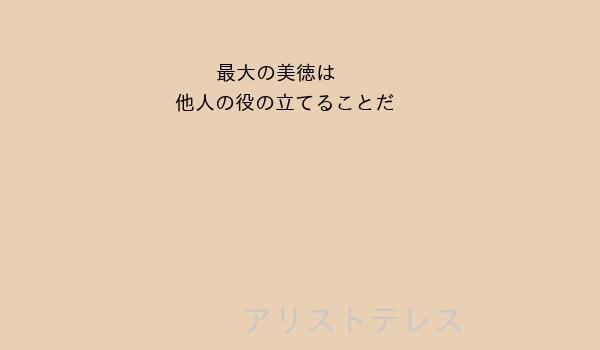
最大の美徳は
他人の役の立てることだ
The greatest virtues are those which are most useful to other persons.
他人の役の立てることだ
The greatest virtues are those which are most useful to other persons.
アリストテレス(-)の名言
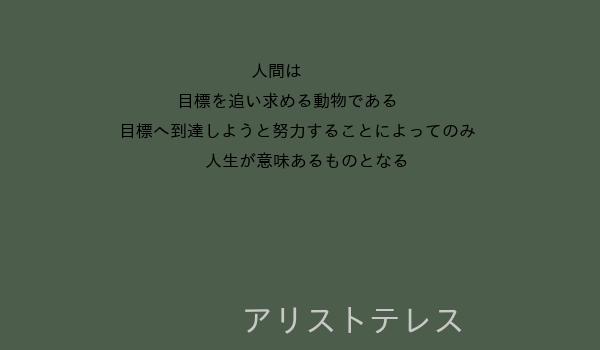
人間は
目標を追い求める動物である
目標へ到達しようと努力することによってのみ
人生が意味あるものとなる
Man is a goal seeking animal. His life only has meaning if he is reaching out and striving for his goals.
目標を追い求める動物である
目標へ到達しようと努力することによってのみ
人生が意味あるものとなる
Man is a goal seeking animal. His life only has meaning if he is reaching out and striving for his goals.
アリストテレス(-)の名言
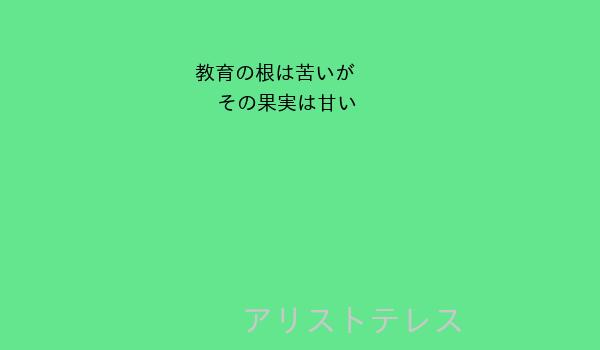
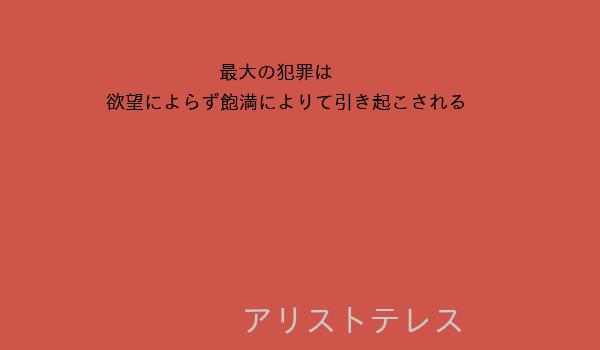
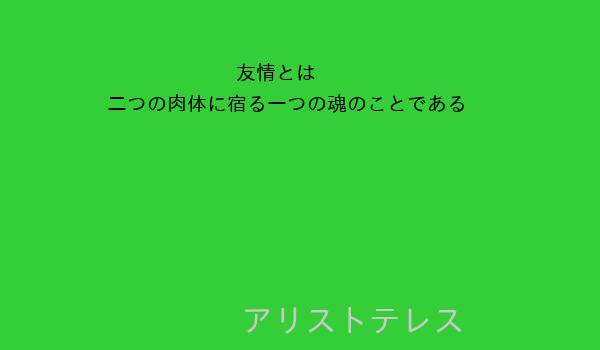
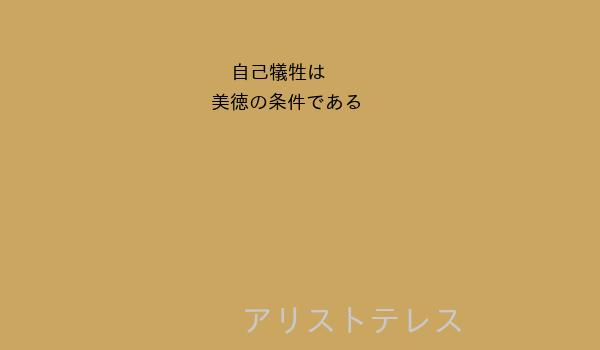
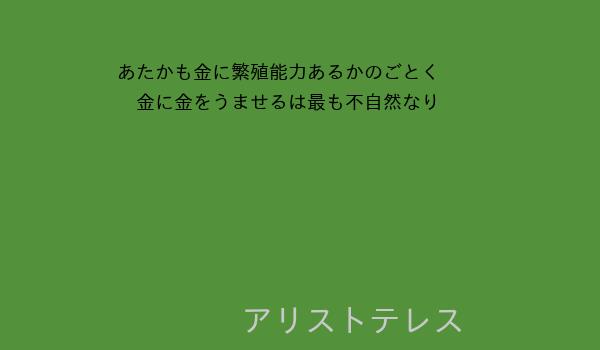
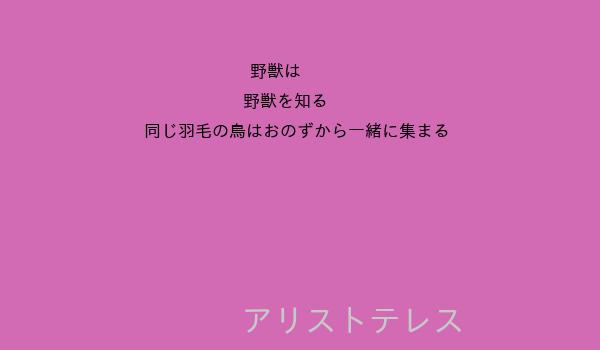
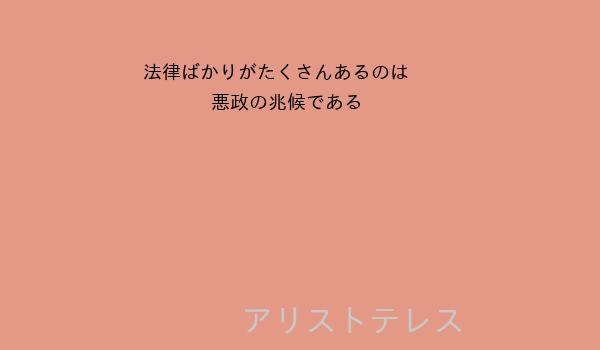
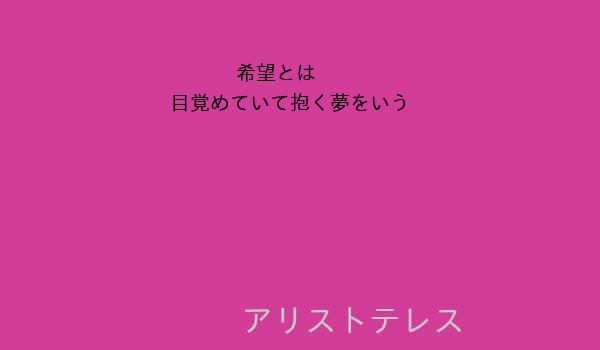
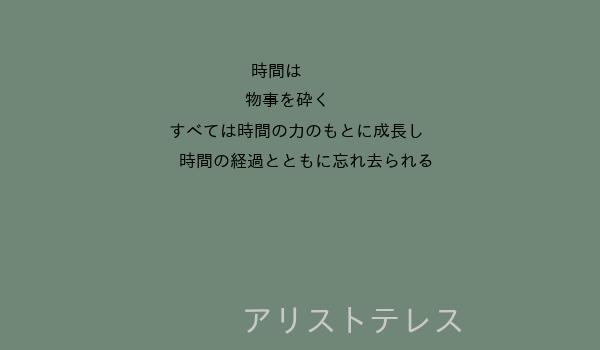
時間は
物事を砕く
すべては時間の力のもとに成長し
時間の経過とともに忘れ去られる
Time crumbles things; everything grows old under the power of Time and is forgotten through the lapse of Time.
物事を砕く
すべては時間の力のもとに成長し
時間の経過とともに忘れ去られる
Time crumbles things; everything grows old under the power of Time and is forgotten through the lapse of Time.
アリストテレス(-)の名言
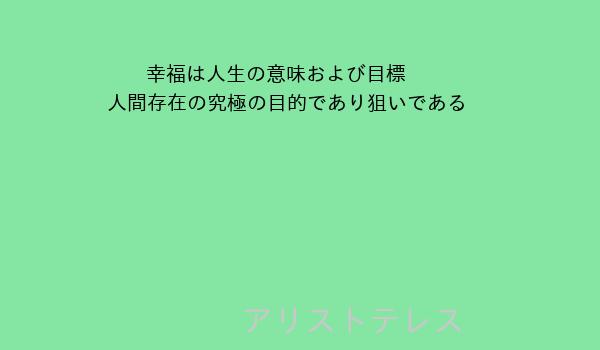
幸福は人生の意味および目標
人間存在の究極の目的であり狙いである
Happiness is the meaning and the purpose of life, the whole aim and end of human existence.
人間存在の究極の目的であり狙いである
Happiness is the meaning and the purpose of life, the whole aim and end of human existence.
アリストテレス(-)の名言
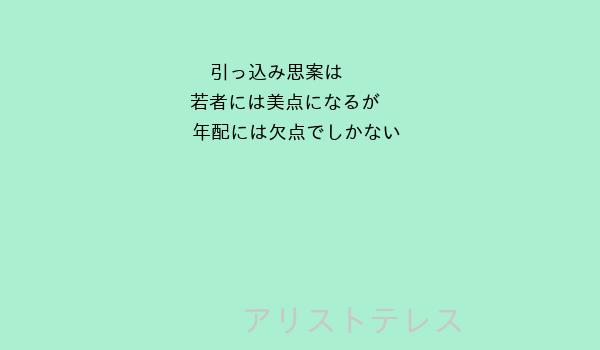
引っ込み思案は
若者には美点になるが
年配には欠点でしかない
Bashfulness is an ornament to youth, but a reproach to old age.
若者には美点になるが
年配には欠点でしかない
Bashfulness is an ornament to youth, but a reproach to old age.
アリストテレス(-)の名言
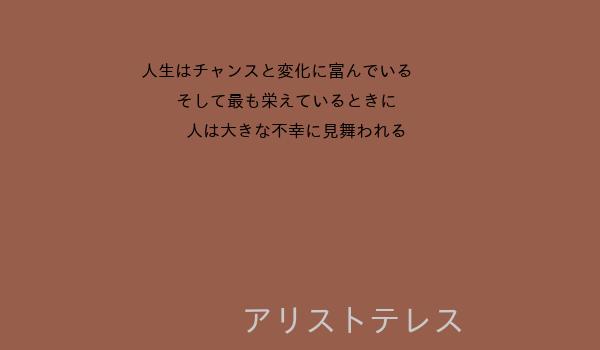
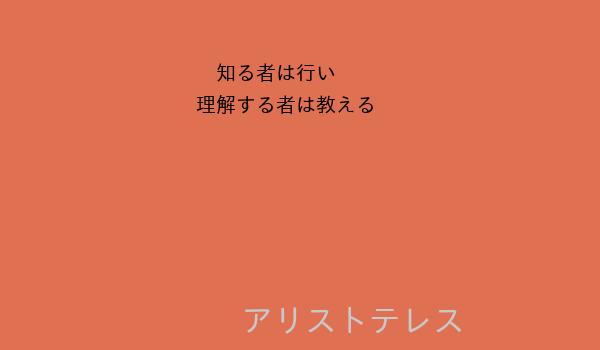
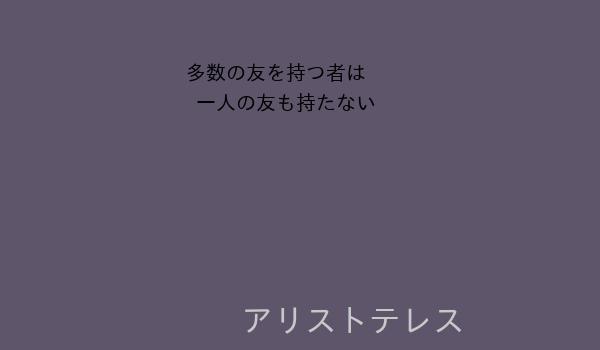
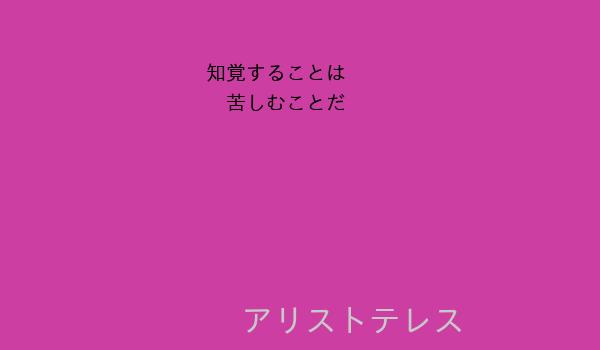
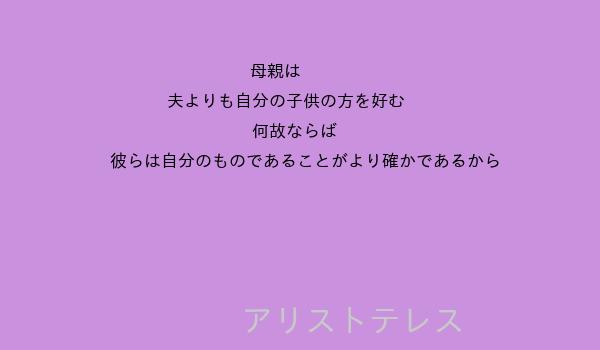
母親は
夫よりも自分の子供の方を好む
何故ならば
彼らは自分のものであることがより確かであるから
Mothers are fonder than fathers of their children because they are more certain they are their own.
夫よりも自分の子供の方を好む
何故ならば
彼らは自分のものであることがより確かであるから
Mothers are fonder than fathers of their children because they are more certain they are their own.
アリストテレス(-)の名言
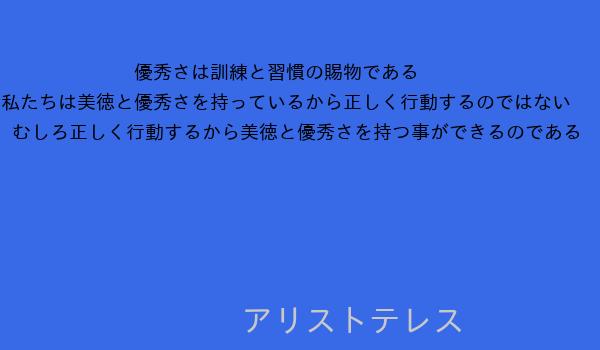
優秀さは訓練と習慣の賜物である
私たちは美徳と優秀さを持っているから正しく行動するのではない
むしろ正しく行動するから美徳と優秀さを持つ事ができるのである
Excellence is an art won by training and habituation. We do not act rightly because we have virtue or excellence, but we rather have those because we have acted rightly.
私たちは美徳と優秀さを持っているから正しく行動するのではない
むしろ正しく行動するから美徳と優秀さを持つ事ができるのである
Excellence is an art won by training and habituation. We do not act rightly because we have virtue or excellence, but we rather have those because we have acted rightly.
アリストテレス(-)の名言
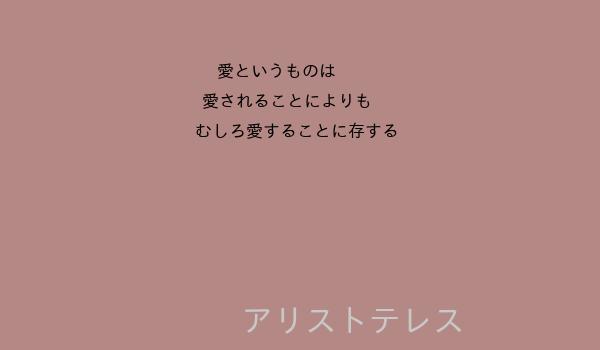
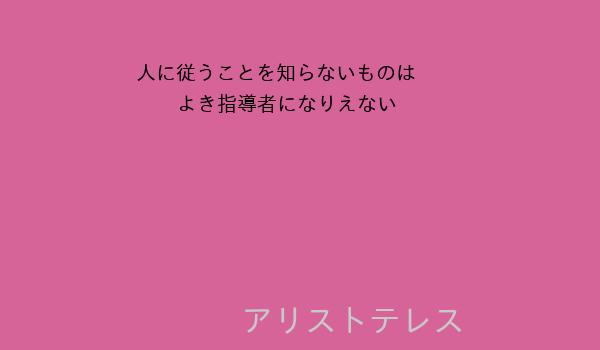
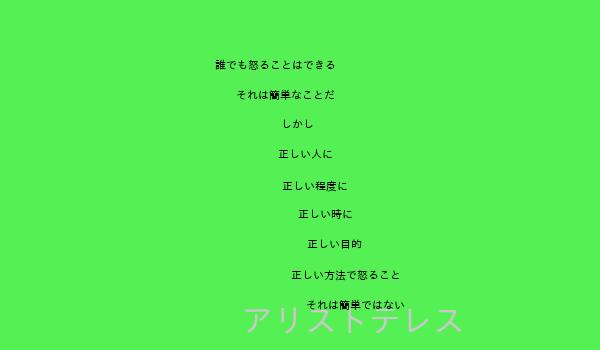
誰でも怒ることはできる
それは簡単なことだ
しかし
正しい人に
正しい程度に
正しい時に
正しい目的
正しい方法で怒ること
それは簡単ではない
Anyone can become angry – that is easy. But to be angry with the right person, to the right degree, at the right time, for the right purpose, and in the right way – this is not easy.
それは簡単なことだ
しかし
正しい人に
正しい程度に
正しい時に
正しい目的
正しい方法で怒ること
それは簡単ではない
Anyone can become angry – that is easy. But to be angry with the right person, to the right degree, at the right time, for the right purpose, and in the right way – this is not easy.
アリストテレス(-)の名言
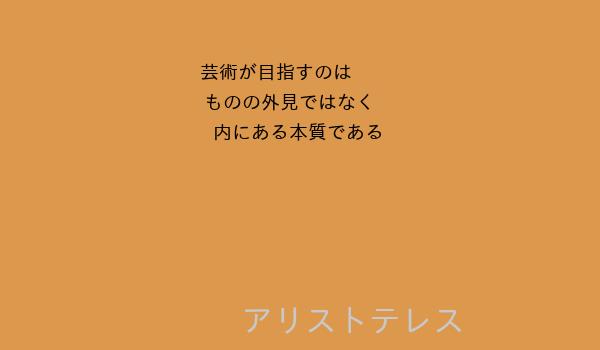
芸術が目指すのは
ものの外見ではなく
内にある本質である
The aim of art is to represent not the outward appearance of things, but their inward significance.
ものの外見ではなく
内にある本質である
The aim of art is to represent not the outward appearance of things, but their inward significance.
アリストテレス(-)の名言
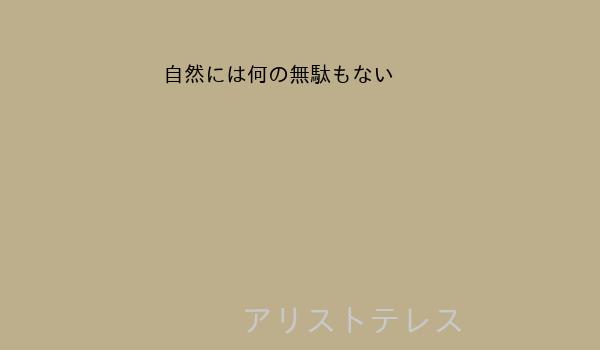
自然には何の無駄もない
Nature does nothing uselessly.
Nature does nothing uselessly.
アリストテレス(-)の名言
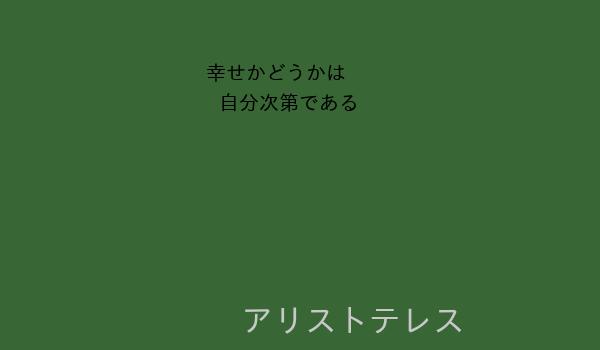
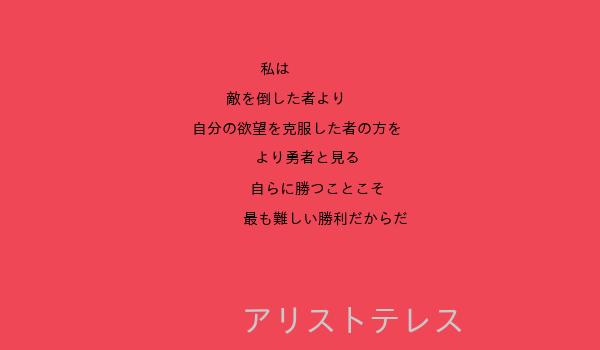
私は
敵を倒した者より
自分の欲望を克服した者の方を
より勇者と見る
自らに勝つことこそ
最も難しい勝利だからだ
I count him braver who overcomes his desires than him who conquers his enemies; for the hardest victory is over self.
敵を倒した者より
自分の欲望を克服した者の方を
より勇者と見る
自らに勝つことこそ
最も難しい勝利だからだ
I count him braver who overcomes his desires than him who conquers his enemies; for the hardest victory is over self.
アリストテレス(-)の名言
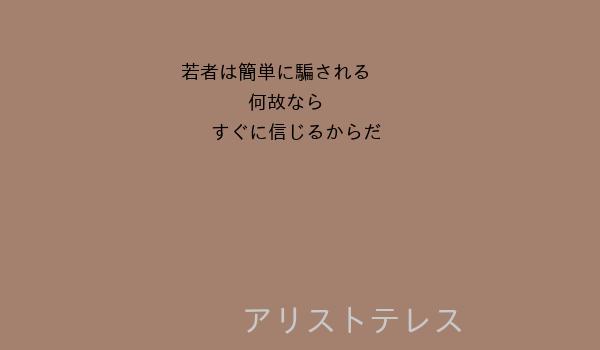
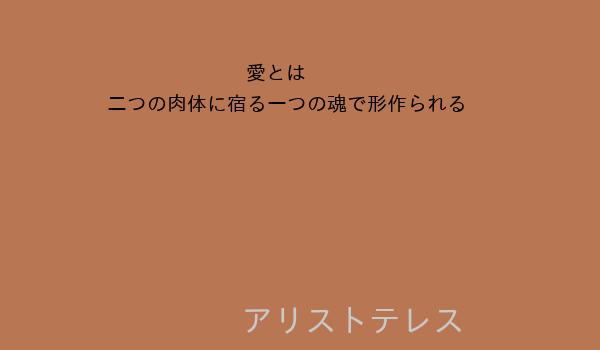
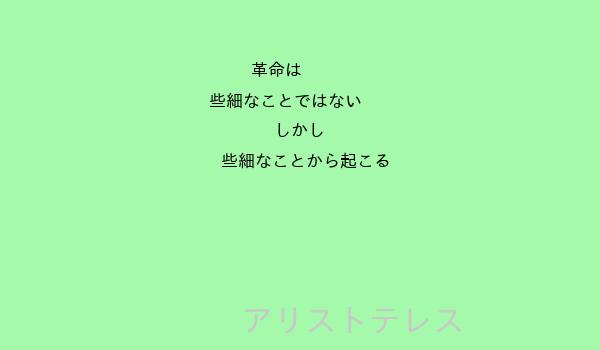
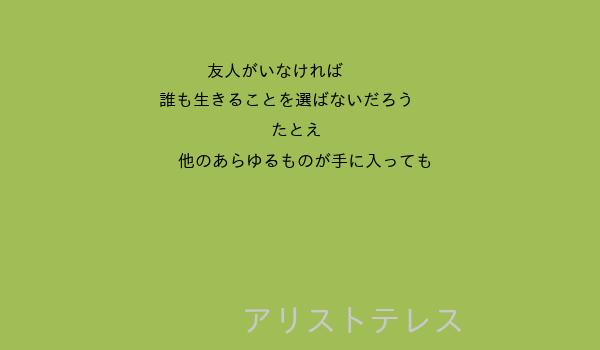
友人がいなければ
誰も生きることを選ばないだろう
たとえ
他のあらゆるものが手に入っても
Without friends no one would choose to live, though he had all other goods.
誰も生きることを選ばないだろう
たとえ
他のあらゆるものが手に入っても
Without friends no one would choose to live, though he had all other goods.
アリストテレス(-)の名言
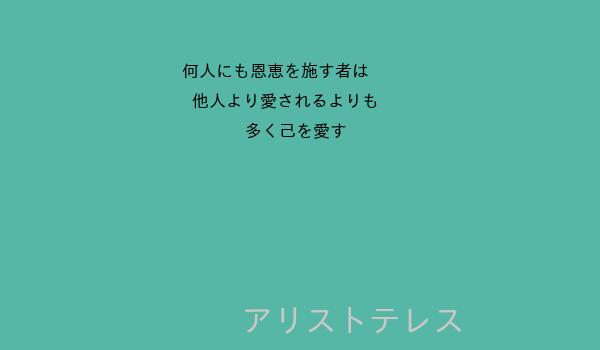
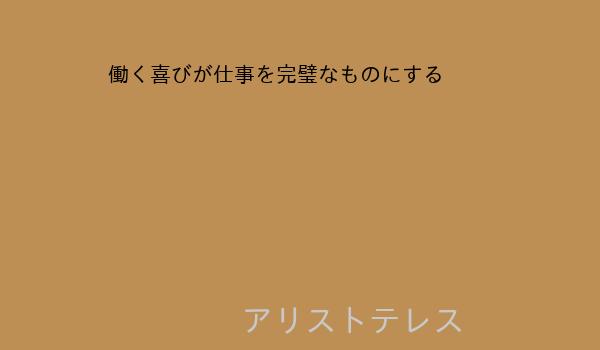
働く喜びが仕事を完璧なものにする
Pleasure in the job puts perfection in the work.
Pleasure in the job puts perfection in the work.
アリストテレス(-)の名言
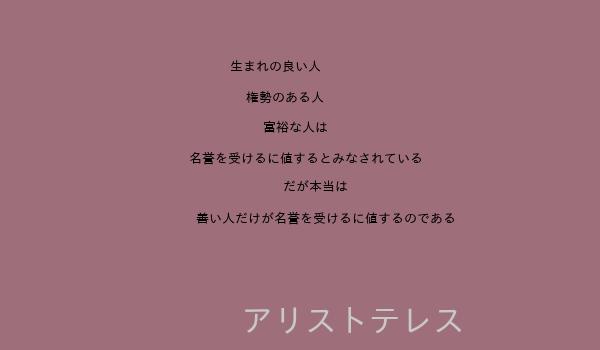
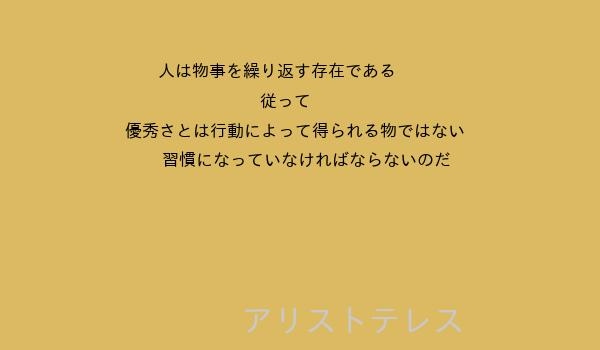
人は物事を繰り返す存在である
従って
優秀さとは行動によって得られる物ではない
習慣になっていなければならないのだ
We are what we repeatedly do. Excellence, then, is not an act, but a habit.
従って
優秀さとは行動によって得られる物ではない
習慣になっていなければならないのだ
We are what we repeatedly do. Excellence, then, is not an act, but a habit.
アリストテレス(-)の名言
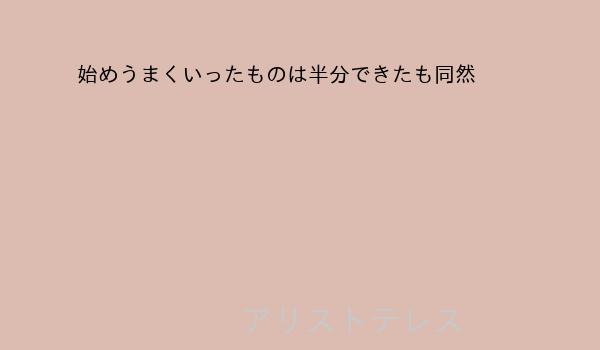
始めうまくいったものは半分できたも同然
Well begun is half done.
Well begun is half done.
アリストテレス(-)の名言
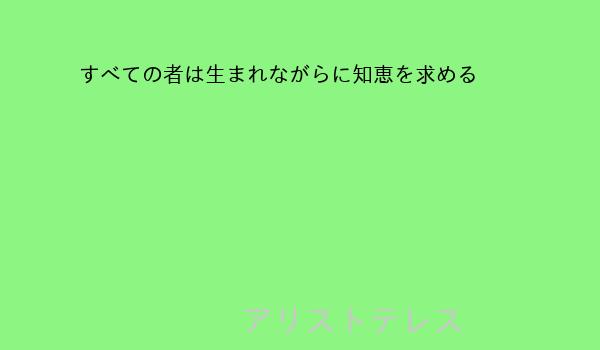
すべての者は生まれながらに知恵を求める
All men by nature desire knowledge.
All men by nature desire knowledge.
アリストテレス(-)の名言
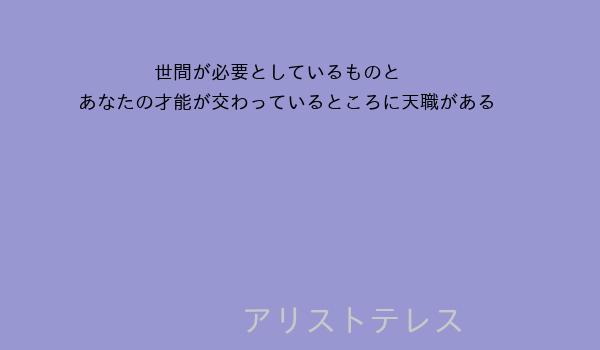
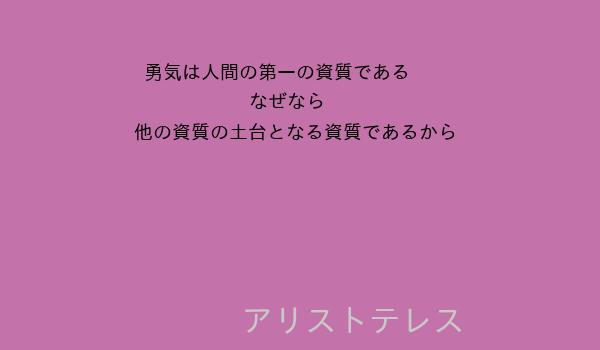
勇気は人間の第一の資質である
なぜなら
他の資質の土台となる資質であるから
Courage is the first of human qualities because it is the quality which guarantees the others.
なぜなら
他の資質の土台となる資質であるから
Courage is the first of human qualities because it is the quality which guarantees the others.
アリストテレス(-)の名言
